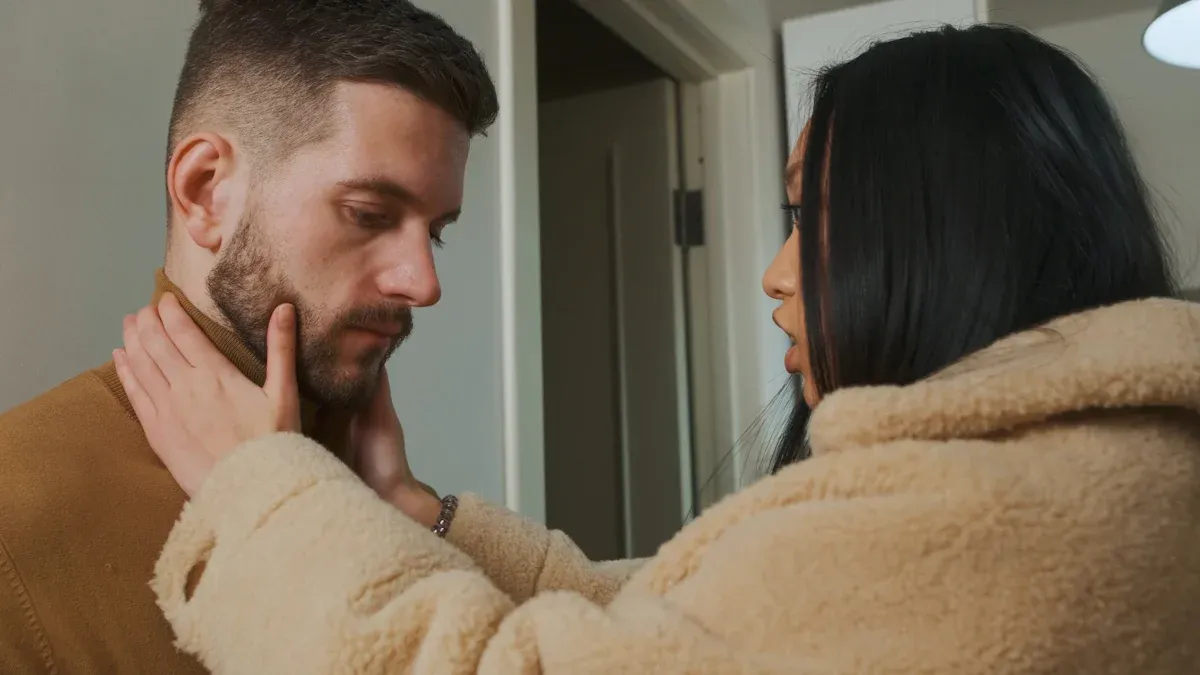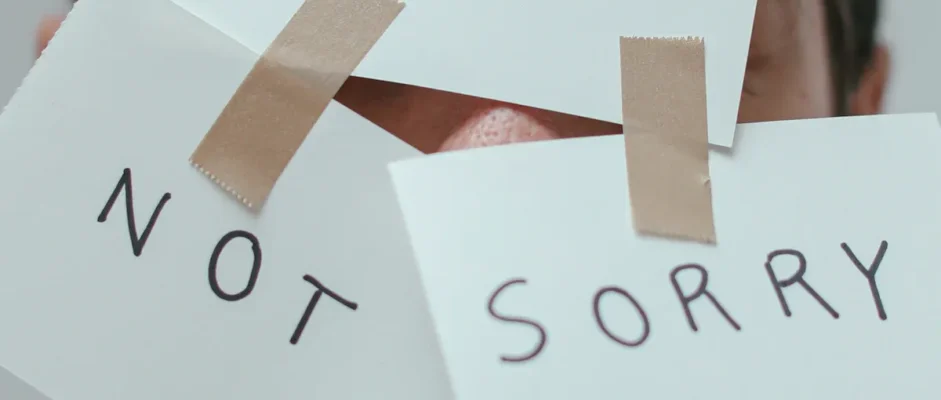Do Narcissists Apologize? You may see that narcissists do not say they are wrong. They usually care more about themselves than your feelings. Many times, their apologies do not feel real or have excuses. You might feel mixed up because they do not take the blame.
Narcissists often do not take the blame.
They do not like to say they did something wrong.
Their main goal is to protect themselves.
Key Takeaways
Narcissists do not like to take blame and hardly say they are wrong. Their apologies might sound caring, but they often make excuses or blame others.
A real apology shows someone is sorry and wants to fix things, but narcissists rarely do this. Look for signs that the apology is not real, like using ifs or blaming someone else.
Fake apologies can hurt your mind and make you feel unsure and mixed up. It is important to set clear rules when dealing with narcissists to keep your feelings safe.
Ask for help from friends or adults you trust when dealing with narcissists. Learning why narcissists act this way can help you handle them better.
Do Narcissists Apologize

You might ask if narcissists say sorry when they are wrong. The answer is not easy. Narcissists sometimes say sorry, but it sounds different. Their words and actions do not always match. Sometimes, they use an apology to get what they want or to stay out of trouble.
Sincere vs. Insincere Apologies
You can tell if an apology is real or fake. A real apology shows someone is truly sorry and wants to fix things. A fake apology has excuses or blames others. Narcissists usually give fake apologies. They might say sorry, but then give reasons or blame you.
Here is a table with phrases narcissists use and what they mean:
Fauxpology Phrase | Implication |
|---|---|
I’m sorry if you were offended | Makes it seem like your feelings are the problem. |
I apologize if I hurt your feelings | Only says sorry if you got hurt, not for what they did. |
I’m sorry but… | Gives excuses and tries to avoid blame. |
I’m sorry, can we just move past this? | Wants to stop talking about it and not take responsibility. |
I said I was sorry! | Says sorry but does not explain or admit what they did. |
You might hear these and feel confused. The words sound like an apology, but you do not feel respected.
Tip: A real apology means taking blame and caring about your feelings. If you hear excuses or blame, it is not a real apology.
Why Apologies Are Rare
Narcissists do not say sorry often. There are a few reasons for this:
Narcissists want to look perfect and in charge. Saying they are wrong makes them feel weak.
They do not really feel what you feel. They know you are hurt, but they do not feel your pain.
Their apologies are to protect themselves or get something they want.
When they do say sorry, it is often just for show. They might say, “I’m sorry you feel that way,” which puts the blame on you.
Sometimes, they do big things to show they are sorry, but it is about control, not real regret.
People with other personality disorders may give better apologies. Narcissists use apologies to keep control or look good.
You might also see these things:
They blame others or promise to change but do not mean it.
They want to protect how they look, not fix the problem.
Note: If an apology is just to make you stop talking or move on fast, it is not real.
Example
If you tell a narcissist their words hurt you, they might say, “I’m sorry if you took it the wrong way.” This blames you. Or they might say, “I said I was sorry, can we just move past this?” This means they want to stop talking, not fix the hurt.
Common Misconceptions
Some people think narcissists never say sorry. They do, but their apologies are not real. Some think any apology means someone wants to change. With narcissists, apologies are for their own needs.
Studies show narcissists:
Use apologies to look good to others.
Do not take real blame.
Want to feel special and better than others.
If you ask, “Do Narcissists Apologize?” now you know they might, but their reasons are not like most people. Their apologies are to help themselves, not you.
Types of Apologies
When you talk to a narcissist, you might notice different ways they say sorry. Some seem real, but others feel fake or are missing. Knowing these patterns helps you see what is true and what is not.
Genuine Apology
A real apology from a narcissist does not happen often. You might hear it only if they feel safe or get something from it. A true apology means they admit what they did and care about your feelings. They take the blame and show they understand you. You feel listened to and respected.
Tip: A real apology does not have excuses or blame. It cares about your feelings and the hurt caused.
Most narcissists, especially covert ones, do not give real apologies. They often do not take the blame and want you to say sorry instead. If you ask, “Do Narcissists Apologize?” you may see they do not feel true regret.
Manipulative Apology
Manipulative apologies happen more often with narcissists. These apologies sound like they fix things, but they help the narcissist. The words seem nice, but their actions show they want control or to avoid trouble.
Control Tactics
Narcissists use apologies to keep control over you. They might say sorry just to stop you from being mad or to look good. Sometimes, they give weak apologies like, “I guess I should tell you I’m sorry,” which do not show real regret.
Fake apologies move blame and do not take responsibility.
Apologies come only when they feel they are losing control.
They might brag after you say sorry, saying, “I am glad you finally admitted you were wrong.”
Avoiding Consequences
Many narcissists say sorry to avoid trouble. They want to look good or not get punished. You might hear, “I will apologize if you will.” These apologies have conditions and focus on what they want.
Manipulative apologies hurt your feelings and break trust.
They move blame and make their mistakes seem small, so you doubt yourself.
The focus stays on the narcissist’s feelings, not the harm done.
Here is a table with common fake apologies:
Type of Apology | Description |
|---|---|
The Takeaway Apology | Uses “but” to take back the apology. |
The Get-Off-My-Back Apology | Feels more like a threat than being sorry. |
The Pay-to-Play Apology | Says sorry only if you do something first. |
The Whitewashing Apology | Makes their actions seem less bad. |
The Repeat Apology | Talks about an old apology to avoid the new problem. |
No Apology
Sometimes, narcissists do not say sorry at all. You might get silence or blame instead of an apology.
Silent Treatment
Narcissists may ignore you or not talk about the problem. This silent treatment makes you feel invisible and not important. After a while, you might start to doubt yourself.
Always ignoring your feelings makes you feel less important.
Trying to get an apology can make you tired and sad.
Deflection
Instead of saying sorry, narcissists often blame you. They might make you upset or act like they are the victim. You might hear, “You’re too sensitive,” or “It’s not my fault.” This blame makes you feel confused and worried.
Note: If you do not get an apology, you might feel tired and start to doubt yourself.
You can see many kinds of apologies from narcissists. Most are fake or missing. Knowing these patterns helps you protect your feelings and set rules.
Insincere Apologies

When a narcissist says sorry, it can feel strange. Their apology might seem fake or confusing. There are signs that show the apology is not real. If you learn these signs, you can protect your feelings. You will know what is really happening.
Red Flags
Excuses
Narcissists do not admit they are wrong. They give reasons for what they did. You might hear, “You made me angry,” or “I had a bad day.” These words take the focus off their actions. The apology is about their problems, not your feelings.
Shifting Blame
Narcissists often say it is your fault or someone else’s fault. They might say, “If you didn’t do that, I wouldn’t act this way.” This makes you feel like you caused their actions. Experts call this deflecting blame. Narcissists use this to avoid saying they are wrong.
Tactic | Description |
|---|---|
Deflecting blame | Makes it look like you caused their actions. |
Guilt-tripping | Makes you feel bad for their mistakes. |
Dismissing feelings | Says your feelings do not matter. |
Invoking self-pity | Uses their own problems as excuses for hurting you. |
Conditional Language
Narcissists use words that make their apology depend on you. You might hear, “I’ll say sorry if you stop being upset,” or “I’ll apologize if you admit you were wrong too.” This shows they do not feel true regret. Their apology depends on what you do, not how they feel.
Tip: If an apology has conditions, excuses, or blame, it is not real.
You might see other signs too:
The apology feels fake and does not show real regret.
Narcissists want you to forget the problem fast.
They say you are holding a grudge or being too sensitive.
Impact on Others
Fake apologies can hurt you a lot. You might feel mixed up or doubt yourself. Over time, these apologies can make you feel sad and worried. You may start to think you are always wrong, which makes you feel bad about yourself.
Fake apologies can make you feel close to the narcissist, even when they treat you badly.
You might feel confused because their words and actions do not match.
You stop trusting the relationship. You get angry when problems do not get fixed.
You may stop sharing your feelings, which keeps you hurt and stops you from healing.
When fake apologies happen again and again, you feel like their mistakes are your fault. This lets them keep hurting you.
Psychological Reasons
When you wonder, “Do Narcissists Apologize?” you need to look at what happens inside their minds. Narcissists act in ways that make real apologies hard. Their thoughts and feelings shape how they respond when they hurt others. Let’s break down the main reasons.
Self-Centeredness
Narcissists focus on themselves more than anyone else. You may notice that they care about their own needs and feelings first. This self-centeredness makes it tough for them to see your side or understand your pain. They often:
Lack affective empathy, so they do not feel what you feel.
Rarely take your perspective, which means they do not see why you are upset.
Use others as tools to get what they want, not as people with feelings.
Covert narcissists sometimes make you feel guilty instead of saying sorry. They might act like the victim, so you end up apologizing to them. You may see them pretend to care, but their actions show they only want to protect themselves.
Ego Protection
Narcissists have fragile self-esteem. They want to look perfect and avoid feeling weak. When you point out their mistakes, they feel threatened. To protect their ego, they:
Deflect blame and say it is someone else’s fault.
Externalize responsibility, so they do not feel shame.
Compulsively blame others to keep their self-image safe.
You might hear them say, “It wasn’t my fault,” or “You made me do it.” These words help them avoid feeling bad about themselves. Narcissists often project their own flaws onto you. This means they blame you for things they do, which keeps them from apologizing.
Lack of Empathy
Empathy means understanding and caring about how others feel. Narcissists struggle with this. Their emotional blind spots make it hard for them to see when they hurt you. Because they do not feel your pain, they:
Focus on self-preservation and avoid taking blame.
Shift responsibility to you or others.
Miss chances to give real apologies because they do not see the harm.
You may notice that narcissists do not recognize when they should say sorry. Their self-centered worldview blocks them from understanding your feelings. This makes genuine apologies rare.
Conclusion
You now know narcissists say sorry for their own benefit. Their apologies talk about themselves, not about hurting you. You can notice tricks like blaming others or making excuses.
Try to stay calm and not get too upset.
Ask people you trust for help.
Look after your feelings and health.
A real apology means admitting mistakes, caring, feeling bad, and wanting to do better. You should always get truth and respect from people close to you.
Transform your Inner Chaos into authentic personal growth!
Stay informed on the latest research advancements covering:
Co-Parenting With A Narcissist
Frequently Asked Questions
Can a narcissist ever give a real apology?
A narcissist might say sorry for real, but it is rare. Most times, their apologies help them look good or stay out of trouble. They do not feel true regret very often.
How do you spot a fake apology from a narcissist?
Watch for excuses or blame. Listen for words that make you feel bad. If the apology feels empty or makes you feel guilty, it is probably not real. Trust how you feel about it.
Why do narcissists avoid saying sorry?
Narcissists want people to think they are perfect. Saying they are wrong feels scary to them. They protect themselves by blaming others or ignoring problems.
What should you do if a narcissist never apologizes?
Make clear rules for yourself. Take care of your feelings. Talk to friends or adults you trust for help. You deserve respect from others.
Do covert narcissists apologize differently than overt narcissists?
Covert narcissists might act like victims or use guilt to avoid blame. Overt narcissists often say they did nothing wrong or get upset. Both kinds have trouble giving real apologies.
Can therapy help a narcissist learn to apologize?
Therapy can help some narcissists see what they do. Change takes time and hard work. Not all narcissists want to get better or admit they are wrong.
How do fake apologies affect your mental health?
Fake apologies can make you doubt yourself. You might feel confused, sad, or worried. After a while, you may stop trusting others or sharing your feelings.
Is it possible to have a healthy relationship with a narcissist?
Healthy relationships need honesty and caring. Narcissists often have trouble with these things. You need strong rules and support to keep yourself safe.
